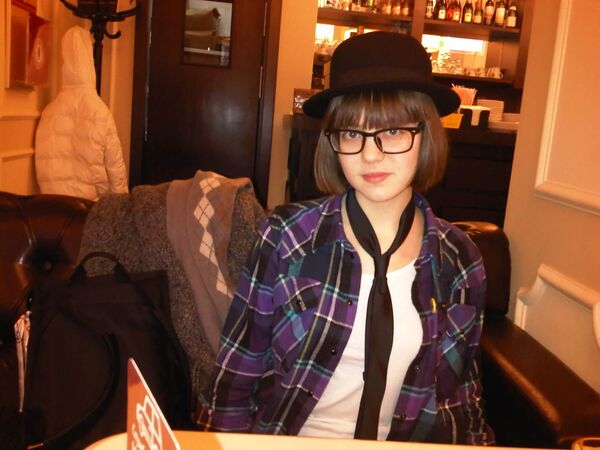While victory for Vladimir Putin at this month’s presidential polls was no surprise to anyone, grassroots politics here were boosted by the victories of dozens of independent candidates at municipal polls for Moscow held on the same day. Opposition activist Vera Kichanova, 20, was one of those who gained a foothold on the lowest rung of Russian government.
“I’ve been interested in politics ever since I was about nine,” she says, sipping on a chocolate milkshake at a downtown Moscow café. “When Putin came to power my favorite TV channel, NTV, was closed down and I asked my dad what had happened. He told me that the new authorities didn’t like freedom of speech.”
“I went to my first protest when I was 18,” she says. “I didn’t go earlier, because if you get arrested when you are a minor, they take you to see your parents.” She was duly arrested at her very first rally, part of radical firebrand Eduard Limonov’s campaign to “defend” the Constitutional right to free assembly, and has been detained five times since.
Kichanova’s generation had been written off by most analysts as apathetic and gadget-obsessed before last December’s disputed parliamentary elections, when thousands of them poured onto the streets to protest what the opposition claimed was mass vote fraud in favor of Putin’s United Russia party.
And wearing thick, over-sized hipster glasses and a trilby hat, Kichanova is also clearly enjoying bucking stereotypes of what a Moscow municipal council member should look and behave like. “I deliberately went to pick up my council papers in pink, knee-high stockings and a plaid shirt,” she laughs. “The officials there were all in blazers. They didn’t say anything though. What could they say?”
“We do things differently,” she says of herself and other newly elected young council members such as Maxim Katz, a 27-year-old who ignored advice to “get a haircut and change my last name” if he wanted to get ahead in politics. But despite Jewish-sounding surnames widely being considered a hindrance in politics in Russia, Katz was also successful in his election bid.
Kichanova and Katz were just two of over 200 candidates supported by a grassroots initiative called Our City that ran classes for would-be councilors ahead of the polls. Kichanova stood as an independent in the Yuzhnoe Tushino district in north-west Moscow. “I felt this sense of responsibility when I heard I’d been elected,” she recalls.
She also lost her job as a reporter for the Voice of America. “Municipal council members aren’t allowed to work for foreign media,” she says. “But the post is unpaid.”
Kichanova made the news in Russia last year when she protested a closely-managed visit by President Dmitry Medvedev to Moscow State University, where she studies journalism. But it’s Putin that she reserves her real scorn for.
“He’s lost touch with reality,” she says, bluntly. “He doesn’t use the Internet and just gets his information from his own sources of propaganda.”
“He doesn’t understand that a new class of people is being born who want to see changes,” she says, shuddering with genuine horror when asked if she thinks Putin could remain in power until 2024, the maximum possible under the Constitution.
Less than a week after her election, Kichanova spoke at a mass rally in downtown Moscow to protest Putin’s return to the Kremlin.
She used her platform to attack Putin supporters who “frighten” Russians with the prospect of a U.S.-backed Orange Revolution, a reference to the almost decade-old revolts in the former Soviet republics of Ukraine and Georgia.
“Who but Putin is afraid of an Orange Revolution?” she asked. “If the Kremlin suddenly announces tomorrow that they will annul the results of the parliamentary elections, isn’t that an Orange Revolution, the very thing they are frightening us with?”
“Did anyone see corpses on the streets of Ukraine or Georgia? Are there dictatorships there? Famine?” she asked, to jeers from some sections of the crowd.
But while Kichanova has been the subject of much media attention since her victory, she is under no illusions as to what she will be able to achieve. Her powers to implement change are, she says, “trifling.”
Or, as she wrote last December on her Live Journal account when announcing her bid: “When you finally understand how the world should be changed, it’s better to start with small things.”
And for now, with Russia’s protest movement on hold until at least May – when Putin is due to be inaugurated – that may have to suffice.
The views expressed in this article are the authors’ and may not necessarily represent those of RIA Novosti.



